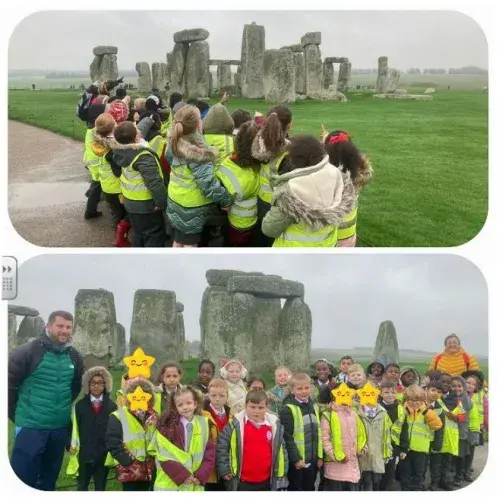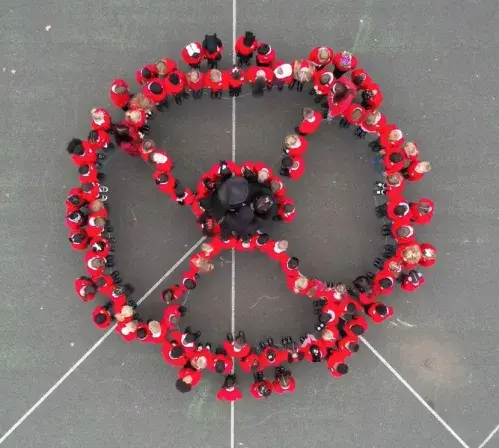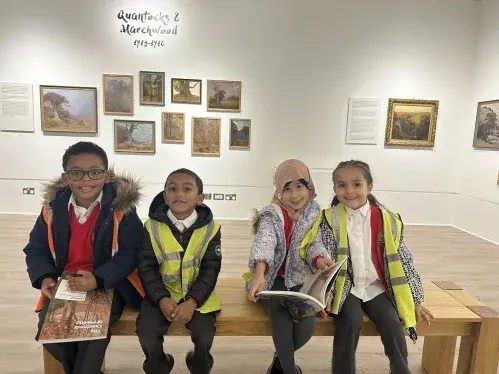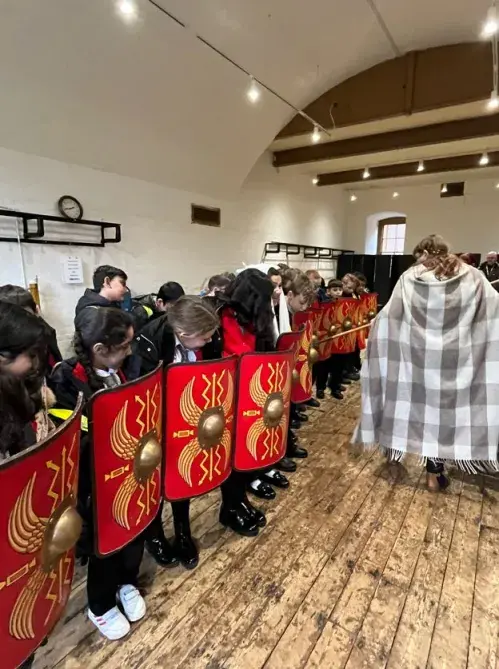Why do we learn history?
The history curriculum is carefully mapped out so that all pupils leave primary school equipped with an understanding of the past that paves the way for their future. Throughout their journey in history, pupils will acquire a breadth of knowledge of places and people and significant events through time: locally, nationally, and internationally.
At Ark Ayrton, we believe a successful primary historian:
-
has high expectations of themselves and demonstrates our values at all times
-
has a clear chronological understanding of the past and how it has shaped the world today
-
analyses sources critically and can apply the skill of critique and evaluation to a wide range of subjects
-
makes links between historical events and times
-
is exposed to a wide range of societies, cultures, and beliefs throughout history
-
understands how equality and diversity has shaped the world we live in
-
can form opinions and beliefs based on the past and can understand the consequences of events that have happened
-
can explain and identify key social, technological, political and religious changes throughout history
Our approach
Implementation
Within our history curriculum, we have made the following definitions:
Schemata
These are complex structures that link knowledge, create meaning and allow skills to be performed. They are built up over time. Learning is about developing those schemata through aquiring knowledge knowledge and making connections with different schemata.
Substantive Knowledge
The residual knowledge that children take away, into their long term memory after it has been taught. This is the most important knowledge that we want children to have within their long term memories.
Subtantive Concepts
The concepts that children come across repeatedly through a subject and each time they revisit the concept, they build and develop a coherant understanding. The substantive concepts are a base for children’s understanding and have been carefully mapped out to ensure that they are revisted within our curriculum.
Disciplinary Knowledge
Disciplinary knowledge is the skills that children need to develop over time in order to be experts in a specific subject. They are methods of working for each subject and the means to how the children can apply the substantive knowledge that they know.
Scope and Sequence
Although history is not taught formally in the Early Years Foundation Stage, the knowledge, skills and vocabulary built up in the ‘understanding the world’ area of learning and all about me, will enable them to access the content at Key Stage One. Children in the Early Years are encouraged to ‘explore’ and ‘observe’ or understand key terms such as ‘similarities and differences’ and ‘change’ which provide a solid foundation for the disciplinary concepts of history and key substantive terms.
In Key Stage One, pupils develop their understanding of chronology, starting with a focus on continuity and change through units, where children answer enquiry questions such as: How have toys changed over time?; Where have Kings and Queens lived throughout time?; before moving on to significant events beyond living memory: What was it like when dinosaurs roamed the Earth? How could the Great Fire of London have been prevented? Children further develop their chronological understanding through a deep dive into the lives of significant individuals.
In Key Stage 2 the History Curriculum divides into two main strands: a study of Britain’s past and a series of studies about Civilizations around the world and their influence on our lives today. When studying British History, time periods are taught chronologically starting with the Stone, Bronze and Iron Age, then exploring the significance and impact of invaders and settlers starting with the Romans, followed by the Anglo Saxons and the Vikings. Pupils then expand their chronological knowledge to significant events beyond 1066: ‘What impact did the industrial revolution have on Britain?’ and ‘How did World War Two change women’s roles within society’.
Pedagogical practice
Each history lesson is driven by an enquiry question, which build up over the course of learning, to enable children to independently answer the final wider enquiry question, which in Key Stage 2, makes children draw across knowledge from different periods of study.
-
Knowledge for lessons is frontloaded through history knowledge organisers, which contain links to videos and educational games. These are uploaded to our homework platform.
-
gaps analysis from data collected is used to ensure that the sequencing of knowledge and learning is adapted and personalised to meet the needs of all learners
-
every lesson starts with a do now in order recall and build on prior knowledge or address a misconception identified from the previous lesson
-
whole class, history reading, reading is used to front load some of the knowledge
-
every lesson has a WALT, which all children work to achieve, however the success criteria for each child creates a personalised, adapted learning path
-
timelines are used at the start of every lesson, so that children begin to build up their understanding of chronology and time
-
All history slides across the academy are consistent and ensure new learning builds on prior learning and that the children understand how this links to future learning
-
independent learning tasks are planned with ‘productive struggle’ in mind according to how best to achieve the WALT of the lesson, often using the structure of ‘I do, we do, you do’ culminating in a learning review or Exit Ticket for pupils to evidence their progress in achieving the WALT or key learning question
-
all children are expected to apply their learning independently for a portion of the lesson
-
learning is enhanced through our extensive programme of trips, visits, workshops and residentials throughout the year
-
Impact
The methods of formative assessment we use to measure out impact within our history teaching are:
-
Exit tickets are used each history lesson to check the children’s understanding and retention of substantive knowledge
-
Verbal feedback
-
Marking to address a misconception, provide a scaffold or challenge children’s understanding
-
Amending teaching to take account of the results from the formative assessment
-
Use of whiteboards
-
Use of self and peer assessments
-
Questioning
The methods of summative assessment we use across our history teaching are:
-
Final output in the form a presentation
-
History quiz assessments
-
Composite task
Non-core Assessment trackers
At the end of each unit, teachers complete a history assessment tracker, which identifies children who have not displayed through both formative and summative assessments, that they have retained the substantive knowledge taught. For high level SEND, children have a bespoke curriculum, which we assess against. For children who have not retained the substantive knowledge, the curriculum is adapted and opportunities for gaps to be plugged are planned in.
Enrichment
We passionately believe in showing children history and allowing them to see and experience it for themselves. We do this through:
-
half termly trips for every year group
-
visitors in school or virtually every half term for all year groups to talk about future career opportunities and enhance learning
-
workshops
Curriculum Overview
Reception
| Autumn | |
|---|---|
|
Understanding the world past and present Comment on images of familiar situations in the past. |
| Spring | |
|---|---|
|
Understanding the World - People, Culture and Communities Show interest in different occupations. |
| Summer | |
|---|---|
|
Understanding the World - People, Culture and Communities Show interest in different occupations. |
Year 1
| Autumn | |
|---|---|
| Toys throughout time Changes within living memory |
| Spring | |
|---|---|
| Knights and their castles & Dinosaurs Significant historical events, people, and places in their own locality Events beyond living memory |
| Summer | |
|---|---|
| People who change the World The lives of significant individuals in the past who have contributed to national and international achievement |
Year 2
| Autumn | |
|---|---|
| Great Fire of London and Guy Fawkes Events beyond living memory |
| Spring | |
|---|---|
| Around the World in 80 days The lives of significant individuals in the past who have contributed to national and international achievement |
| Summer | |
|---|---|
| On the Ocean Wave Significant historical events, people, and places in their own locality |
Year 3
| Autumn | |
|---|---|
| Stone, Iron and Bronze Ages Develop chronologically secure knowledge and understanding of British, local and World History. Establish clear narratives within and across the periods that children study. Note connections, contrasts and trends over time and develop the appropriate use of historical terms. Understand how our knowledge of the past is constructed from a range of sources. |
| Spring | |
|---|---|
| Greeks Develop chronologically secure knowledge and understanding of British, local and World History. Establish clear narratives within and across the periods that children study. Note connections, contrasts and trends over time and develop the appropriate use of historical terms. Understand how our knowledge of the past is constructed from a range of sources. Address and devise historically valid questions about change, cause, similarities and differences and identify their significance. |
| Summer | |
|---|---|
| Egyptians Develop chronologically secure knowledge and understanding of British, local and World History. Establish clear narratives within and across the periods that children study. Note connections, contrasts and trends over time and develop the appropriate use of historical terms. Understand how our knowledge of the past is constructed from a range of sources. Address and devise historically valid questions about change, cause, similarities and differences and identify their significance. |
Year 4
| Autumn | |
|---|---|
| Mayans Develop chronologically secure knowledge and understanding of British, local and World History. Establish clear narratives within and across the periods that children study. Note connections, contrasts and trends over time and develop the appropriate use of historical terms. Understand how our knowledge of the past is constructed from a range of sources. |
| Spring | |
|---|---|
| Roman Empire in Britain Develop chronologically secure knowledge and understanding of British, local and World History. Establish clear narratives within and across the periods that children study. Note connections, contrasts and trends over time and develop the appropriate use of historical terms. Understand how our knowledge of the past is constructed from a range of sources. Construct informed responses that involve thoughtful selection and organisation of relevant historical information. |
| Summer | |
|---|---|
| Anglo Saxons and Scots to Vikings Develop chronologically secure knowledge and understanding of British, local and World History. Establish clear narratives within and across the periods that children study. Note connections, contrasts and trends over time and develop the appropriate use of historical terms. Understand how our knowledge of the past is constructed from a range of sources. |
Year 5
| Autumn | |
|---|---|
| Tudor England Develop chronologically secure knowledge and understanding of British, local and World History. Establish clear narratives within and across the periods that children study. Note connections, contrasts and trends over time and develop the appropriate use of historical terms. Understand how our knowledge of the past is constructed from a range of sources. Address and devise historically valid questions about change, cause, similarities and differences and identify their significance. |
| Spring | |
|---|---|
| Victorians Develop chronologically secure knowledge and understanding of British, local and World History. Establish clear narratives within and across the periods that children study. Note connections, contrasts and trends over time and develop the appropriate use of historical terms. Understand how our knowledge of the past is constructed from a range of sources. Construct informed responses that involve thoughtful selection and organisation of relevant historical information. |
| Summer | |
|---|---|
| World War One Develop chronologically secure knowledge and understanding of British, local and World History. Establish clear narratives within and across the periods that children study. Note connections, contrasts and trends over time and develop the appropriate use of historical terms. Understand how our knowledge of the past is constructed from a range of sources. Construct informed responses that involve thoughtful selection and organisation of relevant historical information. |
Year 6
| Autumn | |
|---|---|
| World War Two Develop chronologically secure knowledge and understanding of British, local and World History. Establish clear narratives within and across the periods that children study. Note connections, contrasts and trends over time and develop the appropriate use of historical terms. Address and devise historically valid questions about change, cause, similarities and differences and identify their significance. Understand how our knowledge of the past is constructed from a range of sources. Construct informed responses that involve thoughtful selection and organisation of relevant historical information. |
| Spring | |
|---|---|
| Equality and Diversity in Modern Britain Develop chronologically secure knowledge and understanding of British, local and World History. Establish clear narratives within and across the periods that children study. Note connections, contrasts and trends over time and develop the appropriate use of historical terms. Address and devise historically valid questions about change, cause, similarities and differences and identify their significance. |
| Summer | |
|---|---|
| Equality and Diversity in Modern Britain Develop chronologically secure knowledge and understanding of British, local and World History. Establish clear narratives within and across the periods that children study. Note connections, contrasts and trends over time and develop the appropriate use of historical terms. Address and devise historically valid questions about change, cause, similarities and differences and identify their significance. |





